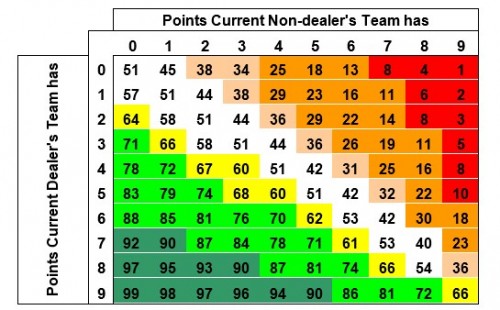Unread post
by raydog » Thu Oct 21, 2021 12:36 pm
I have a different method for constructing this table: start with the odds of any of the 6 possible scores from a randomly dealt hand, then look at the all the possible paths to victory for each team and calculate the odds of that path occurring. Sum all the probabilities and you get the answer. Starting with a score of 0-0 there are LOTS of paths to victory, but a java program sorts through them in under a 1/2 hour.
This method of course relies on those original odds being accurate, and doesn't account for special situations like donating (which imply different odds), but those instances are scarce enough as to not affect the calculated win percentage when rounding to the closest 1%, as Fred has done.
The values I use are:
4 pts, dealing side: .065
2 pt., dealing side: .145
1 pt., dealing side: .457
1 pt., non-dealing side: .186
2 pts., non-dealing side: .122
4 pts., non-dealing side: .025
These values are based on 1,000,000 random games played by my euchre program. You can see that the odds of the dealing side scoring at least one point is 66.7%, very close to the 66% that Fred found, which gives me some confidence that I'm not too far off the mark, even though I know that my program makes some errors in the play of some very specific hands. I also calculated the odds of winning for the team that deals first at 51.7%, again close to Fred's figure but still favoring the dealer a bit more.
Here's another fun statistic: when dealing for the first deal at the beginning of the game, if you deal to the first J (one of 4 cards) the team not dealing for deal has a 52.0% chance of dealing first (assuming first card is given to one of their players, seated to the dealer's left, which is standard protocol). That's a greater advantage than even getting the first deal! If you deal to the first black J (one of 2 cards) the advantage is still 51.0%, which is likely higher that Fred's calculated odds of dealing team winning the match [he only shows 2 significant figures].
Moral of the story: if dealing for deal, and dealing to first J or first black J, deal the first card to your partner, then continue clockwise in order. If the other team objects, let them deal for deal!
